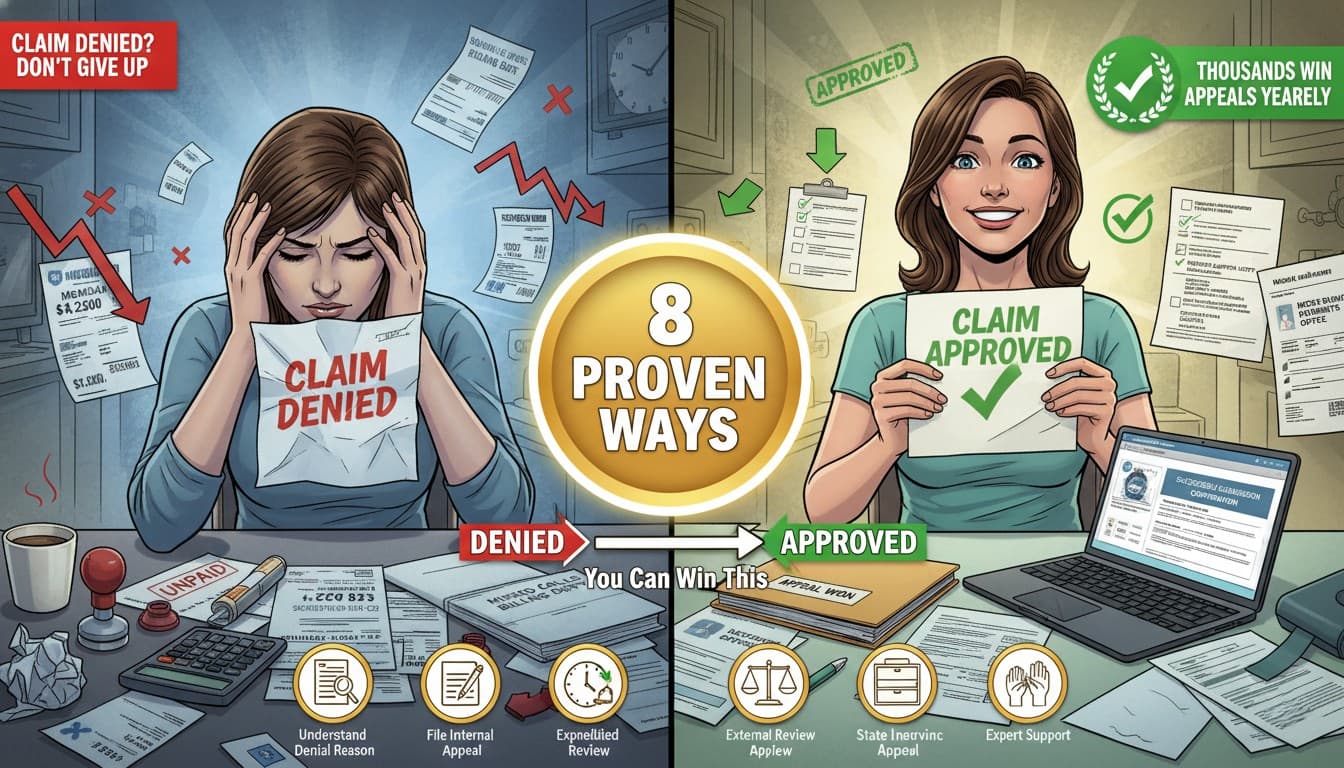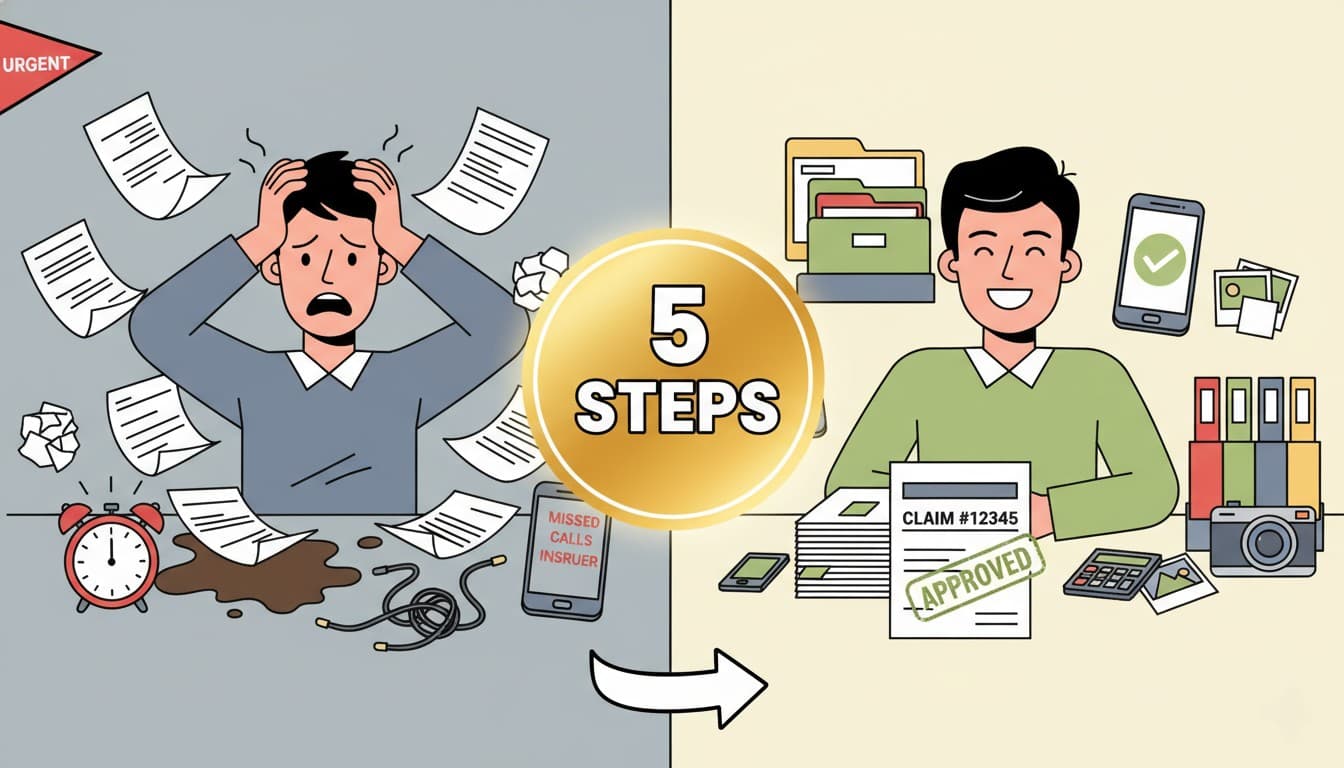I still remember the moment I opened that letter. Big bold letters at the top: "CLAIM DENIED."
My hands were literally shaking. I'd just had a procedure my doctor said was necessary, and now my insurance company was telling me they wouldn't pay the $4,200 bill. I felt angry, helpless, and honestly a little scared about how I'd pay for it.
If you've gotten one of those letters, you know exactly what I'm talking about. That sinking feeling in your stomach. The frustration of doing everything right and still getting rejected. The stress of a huge medical bill you thought would be covered.
Here's what nobody tells you in that moment - a denial isn't the end of the story. It's actually just the beginning of a process that thousands of people win every single year.
I appealed my denial. It took some work, but 45 days later, I got a different letter - "CLAIM APPROVED." Full amount covered. And the process taught me something important: insurance companies count on you giving up. When you don't, you often win.
Let me show you exactly how to do this, step by step.
Step 1: Figure Out Why They Actually Denied You
Before you do anything else, you need to understand the real reason your claim got denied. That denial letter isn't just bad news - it's actually a roadmap for fixing the problem.
Sit down somewhere quiet, take a breath, and read the whole thing carefully. I know it's tempting to just get angry and toss it aside, but that letter contains the specific reason code and explanation you need.
The most common reasons claims get denied:
Missing pre-authorization - You or your doctor didn't get approval before the service. This is huge for surgeries, specialist visits, or expensive tests.
Out-of-network provider - You went to a doctor or facility that's not in your insurance network. Even if you didn't know it.
Service not covered - Your specific plan doesn't include coverage for that treatment, drug, or procedure.
Coding errors - Your doctor's office used the wrong billing code, or information didn't match up between different forms.
"Not medically necessary" - The insurer decided (often wrongly) that the treatment wasn't essential. This is the one that makes people most angry, and it's also one of the most successfully appealed.
Elena from San Diego got her MRI denied and was ready to fight about medical necessity. Then she actually read the letter carefully. Turns out, her doctor's office had forgotten to include the referral code in the submission. One quick call to the doctor, they resubmitted with the correct code, and boom - approved within two weeks. No big appeal needed.
The key point: Don't assume it's your fault or that the decision is final. A huge percentage of denials are just administrative errors or missing paperwork. Sometimes the fix is actually simple.
Write down the specific reason code and explanation. You'll need this for every step that follows.
Step 2: File Your Internal Appeal the Right Way
Here's your most important legal right - you can appeal any denial, and your insurance company has to review it again. You have 180 days from the date on that denial letter to file.
Don't wait. The sooner you appeal, the sooner you potentially get approved.
Here's exactly how to write an effective appeal letter:
Start with the basics - your full name, policy number, claim number, and the date of the denial. Make it easy for them to find your file immediately.
State clearly what you're appealing - "I am appealing the denial of my claim for [specific service] on [date]."
Explain why the denial is wrong - reference the reason they gave, then explain why that reason doesn't apply or why the decision should be reversed.
Keep it professional and factual - angry rants feel good but don't work. Stick to facts, policies, and medical evidence.
What to attach:
- Copy of the original denial letter
- Medical records supporting the need for the treatment
- Your doctor's notes and recommendations
- Any prescriptions or test results
- Receipts or invoices
- A letter from your doctor (this is huge - explained below)
About that doctor's letter: Ask your doctor to write a brief statement explaining why the treatment was medically necessary. Use those exact words - "medically necessary." Doctors know how to write these, and a professional medical opinion carries serious weight.
Carlos from Fresno had knee surgery denied because the insurer claimed it wasn't medically necessary - he could supposedly do physical therapy instead. His orthopedic surgeon wrote a one-page letter explaining that Carlos had already done six months of PT with no improvement, and that without surgery, he'd lose mobility permanently.
That letter changed everything. The insurer approved the $6,200 claim within 30 days.
Critical step most people skip: Make copies of absolutely everything before you mail it. Keep one complete set for yourself. Send your appeal via certified mail with return receipt, so you have proof they received it.
I learned this one the hard way when an insurance company claimed they "never received" my first appeal. The second time, I had tracking proof. Suddenly it got processed immediately.
Step 3: Ask for Expedited Review If You Can't Wait
The standard appeal process can take 30-60 days. But what if you need treatment now? What if waiting could seriously harm your health?
That's when you file an expedited appeal, and insurers are legally required to review it within 72 hours - often much faster in truly urgent situations.
When expedited appeals apply:
- Waiting could seriously jeopardize your health
- You're currently in treatment that might get interrupted
- You need emergency medication or care
- Your doctor says time is critical
You need to specifically request expedited review in your appeal letter. Use words like "urgent," "time-sensitive," or "immediate health risk." Have your doctor support this urgency in their letter too.
Marcy's heart medication refill got denied due to some insurance formulary change. Her cardiologist marked the expedited appeal as urgent - explaining that stopping this medication suddenly could cause a cardiac event.
The insurer approved it within 24 hours. Marcy never missed a dose.
Be honest about urgency. Don't claim something is expedited if it's not truly time-sensitive. That can actually hurt your case. But if it genuinely is urgent, use every tool available.
Step 4: Go External If Internal Appeal Fails
Let's say you did everything right. You filed a great internal appeal with solid evidence, and they still denied you.
Don't give up. You have a second powerful option - external review.
This is when an independent medical expert (not employed by your insurance company) reviews your case and makes a binding decision. Your insurer has to follow whatever the external reviewer decides.
Why external review is so powerful:
- It's free or very low cost (usually under $25, often completely free)
- The reviewer has no financial incentive to deny you
- They're actual medical professionals who understand your condition
- The decision is final and binding on your insurer
- Your denial letter is required to tell you how to request this
You typically have 6 months from your internal appeal denial to file for external review. The process is usually through your state insurance department or an independent review organization they designate.
Dylan from Sacramento had mental health treatment denied. His insurer claimed the intensive therapy program wasn't medically necessary. His internal appeal got denied again with the same reasoning.
He filed for external review. An independent psychiatrist reviewed his complete medical history and treatment plan. Within 45 days, the external reviewer overturned the denial completely. The insurer had to pay over $8,000 in therapy costs.
This is your "second chance." Treat it seriously. Submit clear facts, strong medical evidence, and organized documentation. Leave emotion out of it - just present the case professionally.
Step 5: Document Absolutely Everything
If you take away one thing from this entire guide, let it be this - documentation wins appeals.
Insurance companies handle thousands of claims. Files get lost, phone calls get "no record," and paperwork mysteriously doesn't arrive. The only way to protect yourself is to keep meticulous records of everything.
What to save and organize:
- Every letter from your insurer (denial, responses, updates)
- Every form you fill out or submit
- Copies of every email exchange
- Detailed notes from every phone call - date, time, name of person, employee ID, reference number, what was discussed, what was promised
- All EOBs (Explanation of Benefits)
- Medical records, prescriptions, receipts, invoices
- Your appeal letters and everything you submitted
- Proof of mailing (tracking numbers, certified mail receipts)
I keep a physical folder and a digital backup. Scan everything important. Use your phone to photograph documents if needed.
When you call your insurer, start the conversation by getting the representative's name and employee ID. Take notes while you talk. After the call, immediately write down what was discussed and any promises made.
This saved me when a representative told me over the phone that a certain treatment would be covered. When the claim was denied anyway, my detailed phone notes (with her name, ID, date, and what she said) became crucial evidence in my appeal. They approved it.
Pro tip: Many insurers now have online portals where you can access all your claims, letters, and EOBs. Download and save copies locally. Don't rely on their system alone - companies can "lose" digital records too.
Step 6: Use Technology to Make This Easier
Appealing a health insurance denial is stressful enough without drowning in paperwork and deadlines. Modern tools can simplify the process significantly.
There are online appeal helper tools (many free) that walk you through:
- Creating a properly formatted appeal letter
- Knowing exactly which documents to attach
- Tracking your appeal status and deadlines
- Getting reminders before important dates
- Storing all your records securely in one place
Maya from Oakland was overwhelmed by the appeal process after her surgery got denied. She found a free online tool that helped her build her appeal step-by-step.
The tool caught that she was missing a crucial document (her pre-authorization request) before she submitted. It also reminded her to follow up when the insurer hadn't responded within their required timeframe.
She submitted everything correctly the first time and got approval in three weeks instead of the typical 30-60 days.
The advantage of these tools: They reduce errors, which is actually one of the top reasons appeals fail. Missing a document, using the wrong format, or missing a deadline can sink an otherwise strong appeal.
Step 7: Know Your Legal Rights (And Use Them)
Under the Affordable Care Act, you have specific legal protections during the appeal process. Insurance companies are required to follow these rules.
Your rights include:
- Getting a clear, specific reason for any denial (not vague excuses)
- Filing an internal appeal with your insurer
- Requesting an independent external review
- Asking for expedited review in urgent situations
- Having your appeal reviewed by someone who wasn't involved in the original denial decision
If your insurer isn't following these rules - if they're stalling, refusing to accept your appeal, or not providing required information - you can file a complaint with your state insurance department.
State insurance commissioners take these complaints seriously. They have the power to investigate insurers and force compliance.
I've never had to go this far, but I know people who have. Just mentioning to an uncooperative insurance company that you're prepared to file a state complaint can suddenly make them very helpful.
Your state insurance department is free. They have consumer advocates whose job is to help you navigate this process and ensure insurers follow the law.
Step 8: Get Help When You Need It
Look, this process can be complicated. If you're overwhelmed, sick, or dealing with a particularly complex denial, there's no shame in getting professional help.
Resources available to you:
Your State Insurance Department - Free consumer assistance. They can answer questions, help you file appeals, and sometimes intervene directly with insurers.
Patient Advocacy Organizations - Groups like the Patient Advocate Foundation offer free help navigating insurance appeals. They know the system inside and out.
Healthcare Advocates - Professional advocates (some charge fees, some work pro bono) who specialize in fighting insurance denials. For complex or high-dollar claims, they're worth it.
Your Doctor's Office - Many have staff dedicated to insurance issues. They fight these battles daily and know what works.
Priya from Los Angeles tried appealing on her own twice and got denied both times. She felt like giving up and just paying the $7,000 bill herself.
Then she contacted a nonprofit patient advocacy group. Their advocate looked at her case, realized the insurer was making an error in how they interpreted her policy, and helped her refile with better documentation and more precise language.
Ten days later - approved. The advocate knew exactly which buttons to push and which policy language to reference.
Getting support isn't weakness - it's strategy. These organizations exist because insurance appeals can be confusing, and they want to help people who are already dealing with health issues.
Your Action Plan
If you're holding a denial letter right now, here's what to do today:
- Read the denial letter completely and identify the specific reason
- Call your doctor's office and explain you need help with an appeal - ask them to support you with records and possibly a letter
- Start gathering all relevant medical records, receipts, and documentation
- Write down what happened (treatment, why your doctor recommended it, why you think it should be covered)
- Set a calendar reminder for 30 days before your appeal deadline (you have 180 days, but don't wait that long)
You don't have to do everything in one day. But getting started matters. Insurers absolutely count on people giving up. Every day you delay, their odds go up that you'll just accept the denial and move on.
Don't let them win by default.
The appeals process exists because denials are often wrong - either due to errors, misunderstandings, or overly strict initial reviews. When you appeal properly with good documentation, your chances of success are actually pretty good.
I got my $4,200 approved. Elena got her MRI. Carlos got his surgery. Dylan got his mental health treatment. You can win this too.
A denial letter isn't a closed door. It's just an obstacle you now know how to overcome.











